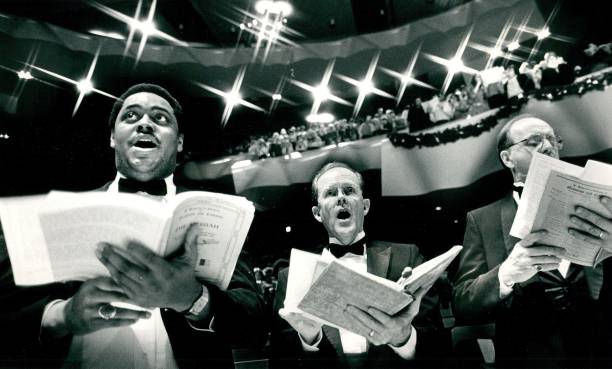“But we must avoid the common fault of pushing the ‘other world’ into the future. It is not future, but present. It parallels our familiar physical world, and the doors between the two worlds are open.” A.W. Tozer
[One of our house church members drew my attention to these words from A.W. Tozer (‘The Pursuit of God’) based on Heb. 12:18-24: God’s people have ALREADY come to Mt. Zion and the Heavenly Jerusalem. We sing (with good intentions)‘We’re Marching to Zion,’ when we’re already there!]

Sociologist and preacher Tony Campolo in a message entitled ‘The Gospel of Hope for a Weary People,’ mentioned how some of his students felt really depressed after their study of TS Eliot over a period of time, especially the prospect of ‘going out’ not with a bang but with a ‘whimper’ – Campolo’s reaction? If we are to go out, let it be with the ‘bang’ of the‘Hallelujah Chorus!!’ (Handel)

Having dealt with hope founded in the past, coming alive in the present, we now consider the present-future aspect of the Christian hope.
Peter’s promise of hope holds true for the ‘present-future.’ 1 Pet. 1:4-5, ‘You have a pure and enduring inheritance that cannot perish – an inheritance that is presently kept safe in heaven for you. Through his faithfulness, you are guarded (a military term, present continuous tense) by God’s power so that you can receive the salvation he is ready to reveal in the last time’ (CEB). And what an inheritance it is, because it’s fulfilled in and guaranteed by Jesus Christ, who is himself absolutely pure, enduring and imperishable!
a) In OT times, the term ‘inheritance’ described the apportioned lot to be possessed in Canaan by Israel. In 1 Peter the Greek word ‘kleronomia’ includes the idea of a fully realized possession of the inheritance, rather than just the title. And, unlike any inheritance in this world (e.g. Canaan could be dispossessed, her inhabitants’ possessions waste away, etc), the inheritance of believers is ‘kept safe’ in heaven for their permanent enjoyment. At its highest, this inheritance is the Lord himself – as the Shorter Catechism puts it, ‘The chief end of man is… to enjoy Him for ever!’ What a permanent and beautiful treasure! Can you and I truly say that we enjoy God for who he is, not just for the good gifts he gives us? If not, we have a mission on our hands…
b) Not only is this heavenly inheritance prepared for our enjoyment, but we, for whom it is divinely intended, are being consciously and continually ‘guarded’ until that ‘final day’ by God’s mighty power (our part in the process is to simply keep believing and persevering in Christ).
c) All this affords believers an ‘indescribable and glorious joy’ (1 Pet. 1:8-9/NRSV) amid our present trials. Almost unbelievable. Any video clip on the suffering underground church in China or Iran will vividly demonstrate this!
By way of practical implementation, N.T. Wright in his ‘Surprised by Hope’ reminds us that, in building for the kingdom in this age, we are building permanently and magnificently! He uses the image of building a cathedral over a long period of time, with many stonemasons and artists each doing their bit.
The architect, who has the whole plan in mind, has passed on his instructions to the masons and workers, each focusing on some part of the great building according to their particular skills. Some may not even live to see the final product, but they know that their time and effort will not be wasted – in fact, they labour in the knowledge that the end-product will surpass their wildest expectations and imaginations, as each one faithfully does his/her part in the grand scheme of things.
Hence our present kingdom work connects with the ultimate future-life in which God will gather all things together and ‘making all things new’ in Christ. Wright adds,‘”What we do in the Lord is ‘not in vain;‘ and that is the mandate we need for every act of justice and mercy, every programme of ecology, every effort to reflect God’s wise stewardly image into his creation…The resurrection of Jesus is the reaffirmation of the goodness of creation, and the gift of the Spirit is there to make us the fully human beings we were supposed to be, precisely so that we can fulfill that mandate at last… Applied to the mission of the church, this means we must work in the present for the advance signs of that eventual state of affairs when God is ‘all in all,’ when his kingdom has come and his will is done ‘on earth as it is in heaven.'” Wow! Imagine how this changes the way we think, live, work, play, relate to God and neighbour, preach/gossip the Good News, disciple the nations, plant ‘churches’ made up of ‘ordinary people’ (particularly the poor) and serve humankind – until at last we fully realize the one great family of God!
But how will we sustain our hope and labours in the meanwhile? Normally my wife and I dream dreams that are totally nonsensical. However Melanie shared a dream (03/04/21) with me recently, and I immediately asked her to write it down because I saw some significance in it. She dreamed that, all of a sudden, there was no bread to be had anywhere in the world. Every shop she visited had no bread. She visited a home for the elderly – they were having lunch but complained that there wasn’t any bread (even yesterday’s bread) on the table. Next Melanie was teaching a classroom of pre-school children who had nothing to eat – frantically she went looking everywhere to find something substantial to eat, if only she could get hold of just a few loaves of bread. Nothing else she gave the children seemed to satisfy their hunger. The dream ended with her feeling totally helpless and despondent. My mind immediately turned to that profound passage in Jn. 6, where Jesus presented himself as ‘bread’ to the crowd, the disciples (including Simon Peter!) and the unbelieving clergy/Jews.
“‘I am the bread of life… He who comes to me will never go hungry, and he who believes in me will never be thirsty… I tell you the truth, unless you eat the flesh of the Son of Man and drink his blood, you have no life in you. Whoever eats my flesh and drinks my blood has eternal life, and I will raise him up at the last day'” (the latter phrase occurs 3 times in Jn. 6) (excerpts from Jn. 6:32-59/NIV). Here’s the thing: every believer, every Christian community, needs to feast daily ‘in their hearts by faith’ on Christ, i.e. his person, promises, presence and life. Unless we get into this on-going spiritual discipline and practice, I don’t think we’ll be able to stay the course until that very final day (one can hardly serve and work when on a hunger-strike). But if we DO, how many will we feed (besides ourselves), and how many will be raised from the dead, now and ‘at the last day!’ For now, it’s not a case of how worthy I am to eat of the bread, but how hungry! ‘This is what God’s Kingdom is like: a bunch of outcasts and oddballs gathered at a table, not because they are rich and worthy or good, but because they are hungry, because they said yes. And there’s always room for more’ (Rachel Held Evans, 1981-2019) (1)
[As a matter of interest, check out the lyrics of some classic hymns on the theme of Zion and feeding on the Bread of Heaven: e.g. John Newton’s ‘Glorious things of Thee are spoken’ and William Williams’‘Guide me, O Thou great Jehovah’ ]
FOOTNOTE:
(1) This top-selling American writer had some wonderful things to say in her short journey on earth. I believe she was right to question popular American evangelicalism and cultural Christianity – however, imho, like so many ‘progressives’/’inclusivists,’ she at times went beyond a scholarly and balanced view of Scripture. Sadly some sincere believers don’t seem to get beyond ‘de-constructing’ their faith to ‘re-constructing’ their faith, based on ‘the faith delivered once and for all’ (Jude v. 3/CEB). A lifetime of walking with the Lord has taught me that we too often throw out the baby with the bathwater! [For my blog-series on Universalism, cf my Archives July 24, 2020]
